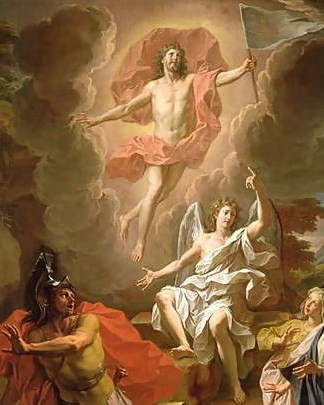God the Son
Christianity is a totally unique religion because it has a totally unique Savior in Jesus Christ. In all other religions, people are trying to reach heaven (or some form of eternal life) through their own efforts. These efforts take the form of following a moral code, or accomplishing prescribed tasks, or other forms of self accomplishment. Only biblical Christianity has God accomplishing the task for a sinful undeserving humanity. In all other religions man is seeking God through his own efforts, but in Christianity Jesus takes the initiative to seek man through the incarnation, crucifixion, and resurrection.

The uniqueness of Jesus, which distinguishes Him from all other humans is that He is the God-man. He is a divine human being, and therefore to my knowledge totally unique in time and eternity. The concept of the God-man is very difficult to understand because there is no basis for comparison in history or our experience now. All the facts in the Bible point to the inescapable conclusion that Jesus is fully God and He is fully man.
The Pre-incarnate Christ
Since Jesus is God, and thus is uncreated, where was He before He took on the flesh? Paul provides the explanation in Philippians 2:5-8 that Christ preexisted in the form of God in heaven having full equality with God. Out of love He gave up that glorious existence, and “emptied Himself” in the sense that He voluntarily gave up His prerogatives as God to take on the form of a bond-servant along with the limitations of human flesh. Christ in no way ceased to be God, and in no way lost any of His attributes of God. Theologians refer to this unique union of two natures as the “hypostatic union”. The Greek word hypostases means natures, therefore they are referring to the union of God and man in one person without mixture or change in either nature. Another theological word used to describe the incarnation is “the kenosis” which is the Greek word for emptying. Jesus voluntarily emptied Himself in the sense that He gave up the glory in heaven in order to take on a weak human body to live in the cess pool of corruption and depravity that we call planet earth. Many New Testament passages speak of the pre-existence of Christ along with His Godly activities. In John 1:1-3, we read that “All things came into being by Him, and apart from Him nothing was created.” Paul wrote to the Colossians that “by Him all things were created, both in the heavens and the earth…all things have been created by Him and for Him.” The author of Hebrews wrote that through Jesus, God created the world, and Jesus is the exact representation of God’s nature. In Hebrews 1:6-12, Jesus is portrayed as much greater than the angels in heaven who in fact worship Jesus and were created by Jesus.
Jesus Himself also claimed to pre-exist the incarnation in passages like John 8:58. In John 8, the leaders in Jerusalem were proud of their heritage as descendants of Abraham. Jesus told them “If you are Abraham’s children, do the deeds of Abraham.” Instead they were seeking to kill the anointed One of God that Abraham looked forward to, “Your father Abraham rejoiced to see My day, and he saw it and was glad.” Jesus was saying that the deeds of Abraham were the belief in the promises of God, first and foremost of which was the promise of the descendant who would bless the whole world (with salvation). The Jews therefore said to Jesus, “You are under 50 years old, how can you act like you have seen and heard Abraham?” Then Jesus blew their mind by saying, “Truly, truly, I say to you, before Abraham was born, I AM.” (Jn.8:58). Can you imagine their surprise? Jesus not only said that He existed before Abraham, but He used the holy memorial name of the God of Israel, I AM, to refer to Himself. Knowing that He was claiming to be God, they picked up stones to throw at Him, but Jesus hid Himself.
The Deity of Christ
Many supposedly learned scholars will tell you that Jesus never claimed to be God, but they must be studying a different Bible than the one I read. One of the main themes of the Gospel of John is the deity of Christ. In 1:1, Jesus is called the Word of God who was with God in the beginning before creation, and then he went on to say that Jesus is the Creator. All through the book of John, Jesus uses the I AM name of God to refer to Himself. In John 10:30, Jesus said, “I and the Father are one in essence.” If our learned scholars don’t know that Jesus claimed to be God, the Jewish religious leaders sure did because when Jesus made these statements they accused Him of blasphemy for claiming to be God. In 10:36, Jesus said he was the “Son of God”, and they should believe Him because He did the works of God. We know that the Jews associated that name with making Himself equal with God from Jn.5:18. In John 14:8, His disciples asked Him to show them God the Father, and Jesus replied, “He who has seen Me has seen the Father”.
All of Christ’s disciples wrote of His deity in passages like Hebrews 1:3, “Jesus is the radiance of God’s glory and the exact representation of His nature”, or Colossians 1:15, “He is the image of God…by Him all things were created”, and then in Col.2:9, “For in Him all the fullness of Deity dwells in bodily form”. In Peter’s epistles he continually calls Jesus the Lord who sits at the right hand of God the Father, and that all angels and authorities and powers have been subjected to Him.
The humanity of Christ is apparent in Scripture in that Jesus was born a baby, grew up normally, had flesh and blood, He got hungry and thirsty, had human emotions, and He bled and died. Many passages speak to the fact that He was fully God and fully man. We are first introduced to the reality of this in Luke 1:35 when the angel told Mary that, “The Holy Spirit will come upon you, and the power of God will overshadow you, and for that reason your holy offspring shall be called the Son of God.” In Romans 1:3, Paul wrote that God sent His Son who was born of a descendant of David according to the flesh, who was declared the Son of God with power by the resurrection from the dead…Jesus Christ our Lord.” Again the obvious passage is Phil.2:5-8, where Paul wrote that Jesus had pre-existed as God in heaven, but out of love He took on the flesh to die for our sins.
Implications
Mankind had serious problems being alienated from God, so God Himself crossed the chasm separating us from God. Through the atoning work of the God-man, we are reunited with God. Redemption is available to all who would believe because a sacrifice of infinite value was made by the only One who could make it. Now we can have real first hand knowledge of God because Jesus has revealed Him, as Jesus said, “He who has seen Me has seen the Father.”
Historical Heresies
Most of the early controversies of the church were related to the nature of Christ. The Ebionites were a first century group that denied the deity of Christ. They were Jewish and strongly monotheistic so they struggled with the trinity concept. Paul’s letter to the Galatians may have been written to counter such a group. They believed that Jesus was an ordinary man blessed with supernatural gifts. The problem of course was they had to reject all the Scriptural references to His preexistence, virgin birth, and His perfection.
Another well known view that almost split the 4th century churches was known as Arianism after a well known elder in Alexandria. A contemporary variety of this today is Jehovah’s Witnesses. Jesus was seen as the highest of all the created beings but not equal with God. Jesus was not eternal or preexistent according to them. This view was condemned by the first church council held at Nicea in 325 AD, and it was continuously condemned by later councils.
Beginning in the early second century the sects known as Gnostics, taught that Christ was not human, He only appeared to be. Many of them believed the Christ was an emanation (spirit) from God that took over the body of the carpenter from Nazareth named Jesus, and at the crucifixion the emanation left so that only Jesus the man died.
The Ministry of Christ
The functions of Christ are revealed as Prophet, Priest, and King. Jesus revealed all the material in the New Testament (Heb.1:2), He reconciles man to God, and He rules in a limited way over all creation now and it will be completely experienced after the 2nd coming. Everyone that heard Him preach recognized that He was a prophet, and Jesus said of Himself in Nazareth that “A prophet is not without honor except in his home town”. Jesus was the great prophet predicted by Moses in Deut.18:15-18. Peter specifically identified Him as such in Acts 3:22. Jesus will also be the great judge after the second coming.
As our great High Priest, Jesus reconciled us to the Father, and Jesus continues to intercede for us as our Advocate. Jesus interceded for His disciples and the future church in His high-priestly prayer of John 17. Jesus prayed that they would have His joy, that they would be kept from the evil one, and that they would have unity. In the reassuring passage of Rom.8:33-34, Paul said it is impossible for anyone to bring a charge against us because Christ is both our judge and advocate who intercedes for us.
Jesus is also our King, the Ruler of all things and places. Jesus claimed that the Kingdom of Heaven was His (Matt.13:41), and in Matt.19:28 He said after the regeneration He will sit on His glorious throne. At present, we do not see Him ruling, but He is ruling over His church (Col.1:18), and where believers are submitting to the lordship Christ in their hearts, Jesus is benevolently ruling over their lives. At the second coming, when He returns in all power, His Kingship will be complete. Therefore, we live today looking forward to that day when all evil will come to an end and everything will be made right in Christ.
CHARLIE TAYLOR
Lesson 3: Fall 09 Lesson 3 ; God the Son
Lesson 3 Podcast:
Podcast: Play in new window | Download

